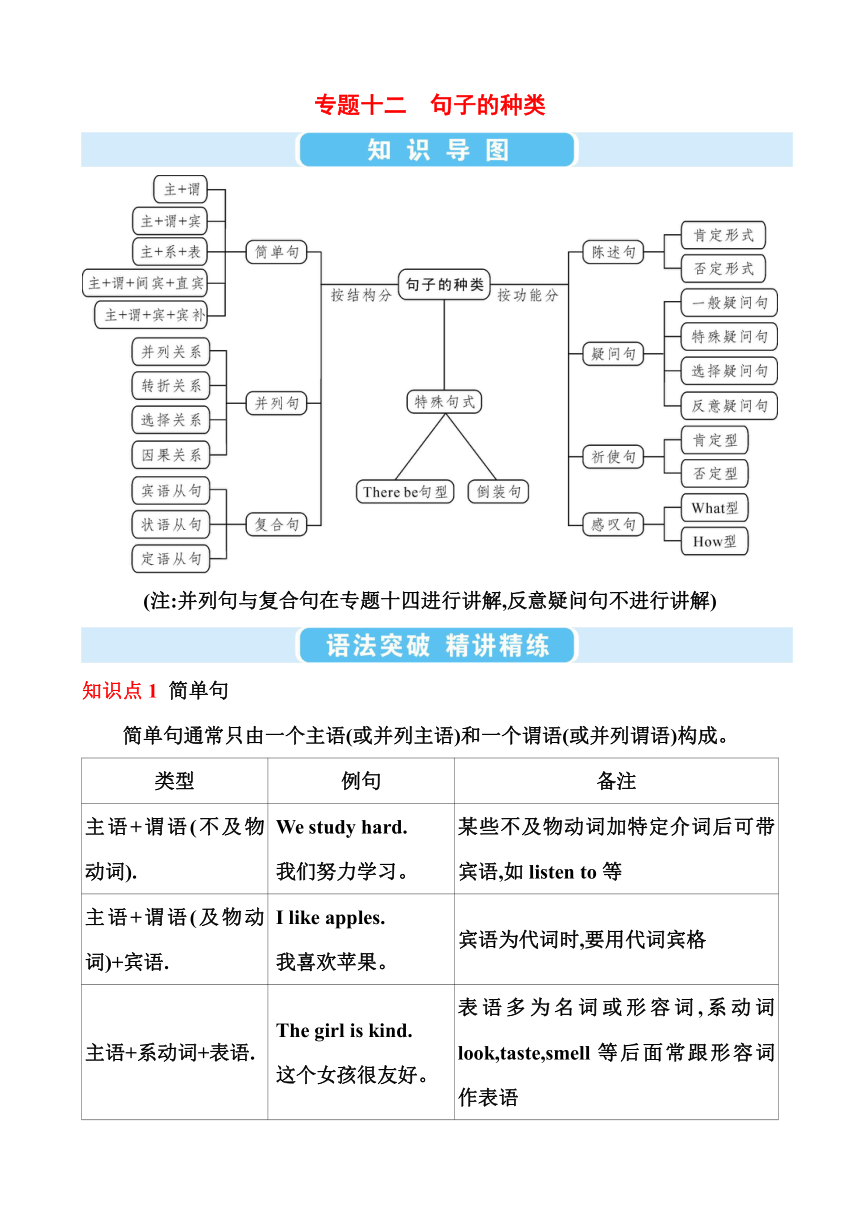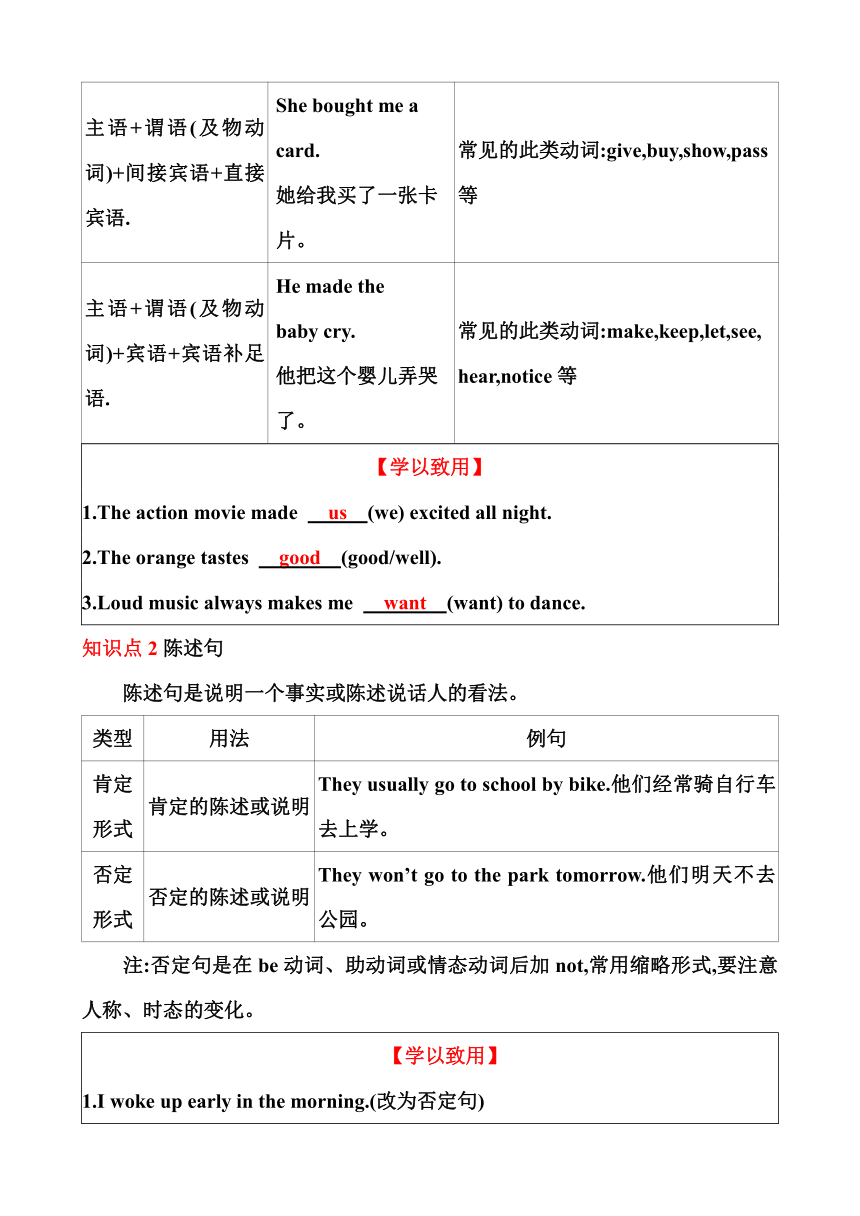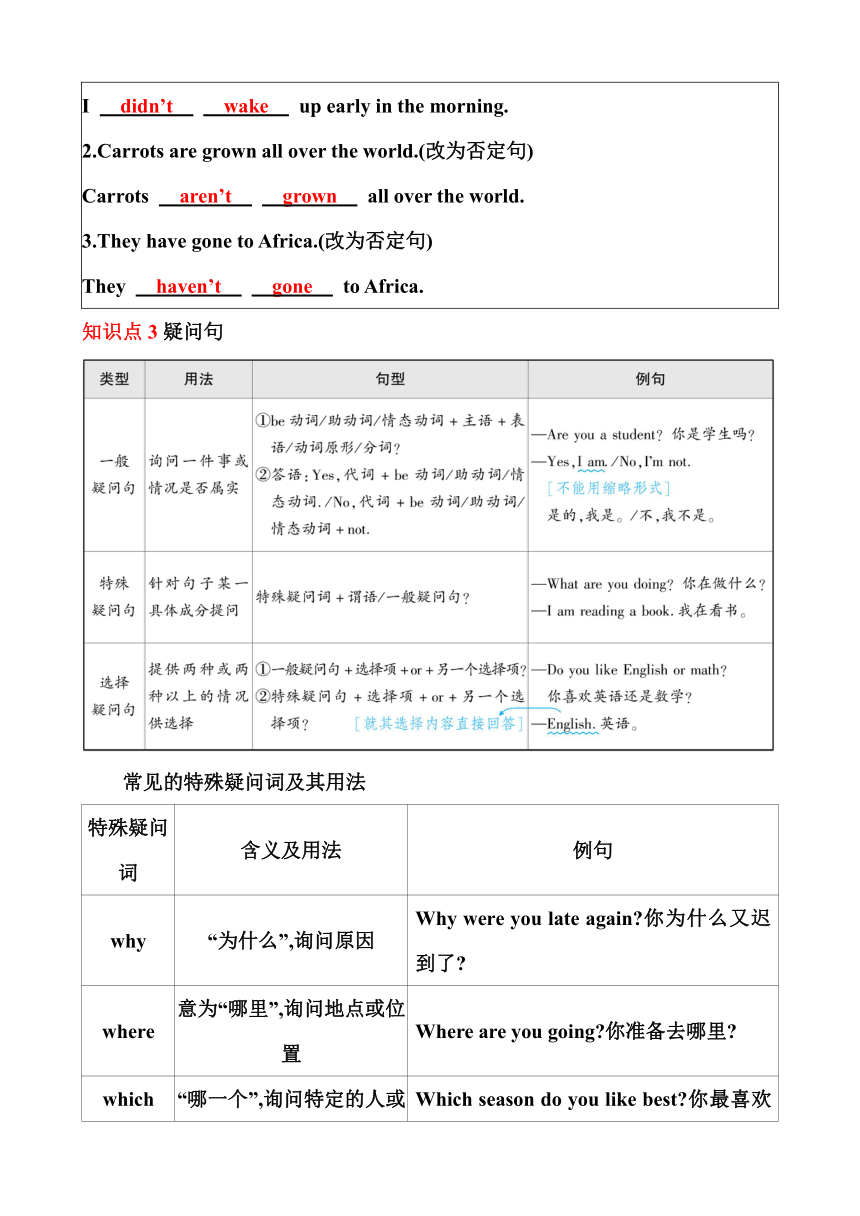12 专题十二 句子的种类 学案 2025年中考英语语法精讲(人教版)
文档属性
| 名称 | 12 专题十二 句子的种类 学案 2025年中考英语语法精讲(人教版) |  | |
| 格式 | docx | ||
| 文件大小 | 434.3KB | ||
| 资源类型 | 教案 | ||
| 版本资源 | 人教新目标(Go for it)版 | ||
| 科目 | 英语 | ||
| 更新时间 | 2024-12-17 10:47:27 | ||
图片预览




文档简介
专题十二 句子的种类
(注:并列句与复合句在专题十四进行讲解,反意疑问句不进行讲解)
知识点1 简单句
简单句通常只由一个主语(或并列主语)和一个谓语(或并列谓语)构成。
类型 例句 备注
主语+谓语(不及物动词). We study hard. 我们努力学习。 某些不及物动词加特定介词后可带宾语,如listen to等
主语+谓语(及物动词)+宾语. I like apples. 我喜欢苹果。 宾语为代词时,要用代词宾格
主语+系动词+表语. The girl is kind. 这个女孩很友好。 表语多为名词或形容词,系动词look,taste,smell等后面常跟形容词作表语
主语+谓语(及物动词)+间接宾语+直接宾语. She bought me a card. 她给我买了一张卡片。 常见的此类动词:give,buy,show,pass等
主语+谓语(及物动词)+宾语+宾语补足语. He made the baby cry. 他把这个婴儿弄哭了。 常见的此类动词:make,keep,let,see, hear,notice等
【学以致用】
1.The action movie made us (we) excited all night.
2.The orange tastes good (good/well).
3.Loud music always makes me want (want) to dance.
知识点2陈述句
陈述句是说明一个事实或陈述说话人的看法。
类型 用法 例句
肯定 形式 肯定的陈述或说明 They usually go to school by bike.他们经常骑自行车去上学。
否定 形式 否定的陈述或说明 They won’t go to the park tomorrow.他们明天不去公园。
注:否定句是在be动词、助动词或情态动词后加not,常用缩略形式,要注意人称、时态的变化。
【学以致用】
1.I woke up early in the morning.(改为否定句)
I didn’t wake up early in the morning.
2.Carrots are grown all over the world.(改为否定句)
Carrots aren’t grown all over the world.
3.They have gone to Africa.(改为否定句)
They haven’t gone to Africa.
知识点3疑问句
常见的特殊疑问词及其用法
特殊疑问词 含义及用法 例句
why “为什么”,询问原因 Why were you late again 你为什么又迟到了
where 意为“哪里”,询问地点或位置 Where are you going 你准备去哪里
which “哪一个”,询问特定的人或物 Which season do you like best 你最喜欢哪一个季节
how “如何,怎样”,询问方式、感受 How do you get to school 你怎么上学
who/whom 意为“谁”,询问身份 Who is your favorite teacher 谁是你最喜欢的老师
when 意味“什么时候”,询问时间 When does the train leave 这列火车什么时候发车
whose 意味“谁的”,询问所有物的归属 Whose dictionary is it 它是谁的词典
【学以致用】
1.— Where shall we meet for the picnic
—At the school gate.
2.— Who is singing over there
—My sister.She likes singing.
3.— Why do you put a lot of snakes into the forest
—To protect the ecosystem.
4.— Have you ever been to Hangzhou
—Yes,I went there last month.
5.—Do you like listening to country music or rock music
—Country music.It makes me relaxed.
知识点4祈使句
祈使句表示请求、命令、劝告、叮嘱、号召、建议等。
结构 肯定型 否定型
动词原形(+宾语)+其他. Turn left at the second crossing.在第二个十字路口向左拐。 Don’t stand in the rain.不要站在雨里。
Be+表语+其他. Be careful,please.请当心。 Don’t be afraid.别害怕。
Let +宾语+动词原形+其他. Let’s stop to have a rest. 让我们停下来休息一会。 Don’t let him stay alone.不要让他独自一个人待着。 Let him not go there alone.不要让他独自一人去那儿。
No+名词/动名词. — No photos.禁止拍照。 No smoking.禁止吸烟。
【要点提醒】
1.“Do+动词原形+其他!”表示一种强烈的感情或请求,do起强调作用。如:
Do finish the task on time!务必要按时完成任务!
2.祈使句后可跟and或or连接的表结果的句子,该句常用一般将来时。如:
Come early,and you will see the film star.早点来,你就会看到这位电影明星。
Hurry up,or you’ll miss the train.赶快,要不然你会错过火车。
【学以致用】
1.(2022·甘肃) Make (make) sure you lock the door when you go out.
2.(2022·湖北十堰改编)Never give (give) up hope no matter what happens.
3.(2022·黑龙江牡丹江)Let’s discuss (讨论) whether teenagers should play live action role playing(剧本杀).
4.(2022·广西百色)Please return (归还) the books to the library on time when you finish reading.
5.努力工作,(那么)你的梦想将会实现。
Work hard, and your dream will come true.
6.告诉我实情,否则我会生气。
Tell me the truth, or I’ll be angry.
知识点5感叹句
感叹句是表示说话时的惊讶、喜悦、气愤、哀伤等强烈感情的句子。通常由What或How引导,What后以名词为中心,How后以形容词或副词为中心,句末常用感叹号。
用法 结构 例句
当感叹句的中心词为名词时多用what 来引导 What+a/an+形容词+可数名词单数形式(+主语+谓语)! What a beautiful girl (she is)! 她是多么漂亮的女孩啊!
What+形容词+可数名词复数形式/不可数名词(+主语+谓语)! What important jobs they have done! 他们做了多么重要的工作啊! What sweet water (it is)!多么甜的水啊!
当感叹句的中心词为形容词或副词时多用how 来引导 How+形容词+a/an+可数名词的单数形式(+主语+谓语)! How beautiful a picture it is! 多么漂亮的一幅画啊!
How+形容词/副词(+主语+谓语)! How cute (the dog is)!(这只狗)多么可爱啊!
How+主语+谓语! How time flies!时间过得多么快啊!
【学以致用】
1. What a nice view from this window!
2. How creative these artworks are!
3. What good weather it is today!
4.Holly’s mother made delicious zongzi yesterday.(改为感叹句)
What delicious zongzi Holly’s mother made yesterday!
根据句意填空(每空一词)
5.流溪河的水多么清澈啊!
How clean the water in the Liuxi River is!
知识点6There be句型
There be句型的常用结构:
时态 结构 例句
一般现在时 There is/are+sb./sth.+地点状语/表示现在的时间状语. There is an apple on the desk.桌上有一个苹果。
一般过去时 There was/were+sb./sth.+地点状语/表示过去的时间状语. There were many people in the theater last night.昨晚,剧院里有很多人。
一般将来时 There will be(is/are going to be)+sb./sth.+地点状语/表示将来的时间状语. There is going to be a basketball match next Friday.下周五,将有一场篮球比赛。
与情态动 词连用 There+情态动词+be+sb./sth.+地点状语/时间状语. There must be some cute animals in the zoo. 动物园里一定有一些可爱的动物。
注:There be句型表示“在某处有某物”,强调客观存在;have 表示“拥有”,是一种所属关系。如:
There is a little garden in the yard.院子里有个小花园。
I have a pet cat.我有一只宠物猫。
【学以致用】
用be或have的适当形式补全句子
1.There was a small tree behind our house ten years ago.
2.There is a set of keys in the desk.
3.There are some students playing basketball on the playground now.
4.The boy likes playing tennis and he has three tennis balls.
5.There is still some milk and fruit in the fridge.What else shall we buy
6.—There is going to be/will be a basketball game against Class Two this Sunday.
—I see.I will come and cheer you on.
(注:并列句与复合句在专题十四进行讲解,反意疑问句不进行讲解)
知识点1 简单句
简单句通常只由一个主语(或并列主语)和一个谓语(或并列谓语)构成。
类型 例句 备注
主语+谓语(不及物动词). We study hard. 我们努力学习。 某些不及物动词加特定介词后可带宾语,如listen to等
主语+谓语(及物动词)+宾语. I like apples. 我喜欢苹果。 宾语为代词时,要用代词宾格
主语+系动词+表语. The girl is kind. 这个女孩很友好。 表语多为名词或形容词,系动词look,taste,smell等后面常跟形容词作表语
主语+谓语(及物动词)+间接宾语+直接宾语. She bought me a card. 她给我买了一张卡片。 常见的此类动词:give,buy,show,pass等
主语+谓语(及物动词)+宾语+宾语补足语. He made the baby cry. 他把这个婴儿弄哭了。 常见的此类动词:make,keep,let,see, hear,notice等
【学以致用】
1.The action movie made us (we) excited all night.
2.The orange tastes good (good/well).
3.Loud music always makes me want (want) to dance.
知识点2陈述句
陈述句是说明一个事实或陈述说话人的看法。
类型 用法 例句
肯定 形式 肯定的陈述或说明 They usually go to school by bike.他们经常骑自行车去上学。
否定 形式 否定的陈述或说明 They won’t go to the park tomorrow.他们明天不去公园。
注:否定句是在be动词、助动词或情态动词后加not,常用缩略形式,要注意人称、时态的变化。
【学以致用】
1.I woke up early in the morning.(改为否定句)
I didn’t wake up early in the morning.
2.Carrots are grown all over the world.(改为否定句)
Carrots aren’t grown all over the world.
3.They have gone to Africa.(改为否定句)
They haven’t gone to Africa.
知识点3疑问句
常见的特殊疑问词及其用法
特殊疑问词 含义及用法 例句
why “为什么”,询问原因 Why were you late again 你为什么又迟到了
where 意为“哪里”,询问地点或位置 Where are you going 你准备去哪里
which “哪一个”,询问特定的人或物 Which season do you like best 你最喜欢哪一个季节
how “如何,怎样”,询问方式、感受 How do you get to school 你怎么上学
who/whom 意为“谁”,询问身份 Who is your favorite teacher 谁是你最喜欢的老师
when 意味“什么时候”,询问时间 When does the train leave 这列火车什么时候发车
whose 意味“谁的”,询问所有物的归属 Whose dictionary is it 它是谁的词典
【学以致用】
1.— Where shall we meet for the picnic
—At the school gate.
2.— Who is singing over there
—My sister.She likes singing.
3.— Why do you put a lot of snakes into the forest
—To protect the ecosystem.
4.— Have you ever been to Hangzhou
—Yes,I went there last month.
5.—Do you like listening to country music or rock music
—Country music.It makes me relaxed.
知识点4祈使句
祈使句表示请求、命令、劝告、叮嘱、号召、建议等。
结构 肯定型 否定型
动词原形(+宾语)+其他. Turn left at the second crossing.在第二个十字路口向左拐。 Don’t stand in the rain.不要站在雨里。
Be+表语+其他. Be careful,please.请当心。 Don’t be afraid.别害怕。
Let +宾语+动词原形+其他. Let’s stop to have a rest. 让我们停下来休息一会。 Don’t let him stay alone.不要让他独自一个人待着。 Let him not go there alone.不要让他独自一人去那儿。
No+名词/动名词. — No photos.禁止拍照。 No smoking.禁止吸烟。
【要点提醒】
1.“Do+动词原形+其他!”表示一种强烈的感情或请求,do起强调作用。如:
Do finish the task on time!务必要按时完成任务!
2.祈使句后可跟and或or连接的表结果的句子,该句常用一般将来时。如:
Come early,and you will see the film star.早点来,你就会看到这位电影明星。
Hurry up,or you’ll miss the train.赶快,要不然你会错过火车。
【学以致用】
1.(2022·甘肃) Make (make) sure you lock the door when you go out.
2.(2022·湖北十堰改编)Never give (give) up hope no matter what happens.
3.(2022·黑龙江牡丹江)Let’s discuss (讨论) whether teenagers should play live action role playing(剧本杀).
4.(2022·广西百色)Please return (归还) the books to the library on time when you finish reading.
5.努力工作,(那么)你的梦想将会实现。
Work hard, and your dream will come true.
6.告诉我实情,否则我会生气。
Tell me the truth, or I’ll be angry.
知识点5感叹句
感叹句是表示说话时的惊讶、喜悦、气愤、哀伤等强烈感情的句子。通常由What或How引导,What后以名词为中心,How后以形容词或副词为中心,句末常用感叹号。
用法 结构 例句
当感叹句的中心词为名词时多用what 来引导 What+a/an+形容词+可数名词单数形式(+主语+谓语)! What a beautiful girl (she is)! 她是多么漂亮的女孩啊!
What+形容词+可数名词复数形式/不可数名词(+主语+谓语)! What important jobs they have done! 他们做了多么重要的工作啊! What sweet water (it is)!多么甜的水啊!
当感叹句的中心词为形容词或副词时多用how 来引导 How+形容词+a/an+可数名词的单数形式(+主语+谓语)! How beautiful a picture it is! 多么漂亮的一幅画啊!
How+形容词/副词(+主语+谓语)! How cute (the dog is)!(这只狗)多么可爱啊!
How+主语+谓语! How time flies!时间过得多么快啊!
【学以致用】
1. What a nice view from this window!
2. How creative these artworks are!
3. What good weather it is today!
4.Holly’s mother made delicious zongzi yesterday.(改为感叹句)
What delicious zongzi Holly’s mother made yesterday!
根据句意填空(每空一词)
5.流溪河的水多么清澈啊!
How clean the water in the Liuxi River is!
知识点6There be句型
There be句型的常用结构:
时态 结构 例句
一般现在时 There is/are+sb./sth.+地点状语/表示现在的时间状语. There is an apple on the desk.桌上有一个苹果。
一般过去时 There was/were+sb./sth.+地点状语/表示过去的时间状语. There were many people in the theater last night.昨晚,剧院里有很多人。
一般将来时 There will be(is/are going to be)+sb./sth.+地点状语/表示将来的时间状语. There is going to be a basketball match next Friday.下周五,将有一场篮球比赛。
与情态动 词连用 There+情态动词+be+sb./sth.+地点状语/时间状语. There must be some cute animals in the zoo. 动物园里一定有一些可爱的动物。
注:There be句型表示“在某处有某物”,强调客观存在;have 表示“拥有”,是一种所属关系。如:
There is a little garden in the yard.院子里有个小花园。
I have a pet cat.我有一只宠物猫。
【学以致用】
用be或have的适当形式补全句子
1.There was a small tree behind our house ten years ago.
2.There is a set of keys in the desk.
3.There are some students playing basketball on the playground now.
4.The boy likes playing tennis and he has three tennis balls.
5.There is still some milk and fruit in the fridge.What else shall we buy
6.—There is going to be/will be a basketball game against Class Two this Sunday.
—I see.I will come and cheer you on.
同课章节目录
- 词法
- 名词
- 动词和动词短语
- 动词语态
- 动词时态
- 助动词和情态动词
- 非谓语动词
- 冠词
- 代词
- 数词和量词
- 形容词副词及其比较等级
- 介词和介词短语
- 连词和感叹词
- 构词法
- 相似、相近词比较
- 句法
- 陈述句
- 一般疑问句和否定疑问句
- 特殊疑问句及选择疑问句
- 反意疑问句
- 存在句(There be句型)
- 宾语从句
- 定语从句
- 状语从句
- 主谓一致问题
- 简单句
- 并列句
- 复合句
- 主谓一致
- 主、表语从句
- 名词性从句
- 直接引语和间接引语
- 虚拟语气
- 感叹句
- 强调句
- 倒装句
- 祈使句
- 句子的成分
- 句子的分类
- 题型专区
- 单项选择部分
- 易错题
- 完形填空
- 阅读理解
- 词汇练习
- 听说训练
- 句型转换
- 补全对话
- 短文改错
- 翻译
- 书面表达
- 任务型阅读
- 语法填空
- 其他资料
